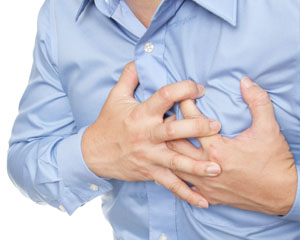Chest Wall Pain Guide
Do you know about chest wall pain or perhaps experienced this, so if you have pain in
the bones, cartilage, and muscles that make up the chest wall is likely that
you suffer from this pain. This happens in a specific area of the chest and may feel
worse pain when
pressure is applied to the wall area., in medical
terms is known as costochondritis, is an inflammatory condition
that affects many people and is one of
the most common causes of chest pain. Women and men over
the age of 40 years are particularly vulnerable can be affected by
costochondritis but it can be affect to anyone and anywhere.
Besides
chest wall pain, costochondritis may
also be referred to as costosternal syndrome or costosternal chondrodynia. A
person with this pain has discomfort that originates from the structures of the
chest wall. The chest wall includes the skin, ribs and muscles that surround
the ribs. Relief for Non Cardiac Chest wall
pain can be difficult to come by. Quite often a full evaluation is done to rule
out cardiac sources of chest pain but if none are found consideration of non
cardiac causes can be lacking.
Chest Wall Pain Causes
Chest wall pain can be caused by
many problems, including:
- Prolonged or violent coughing,
which can strain the muscles or ligaments in the chest.
- An injury, such as a blow to the
chest.
- Inflammation of the cartilage of
the rib cage (costochondritis)
- Heart disease or heart attacks typically cause pain in chest wall, but other minor problems and urgent medical conditions can also
contribute. Chest pain can also vary among individuals and is often described
as an aching, dull, sharp or stabbing sensation in the chest, sternum and the
ribcage. Chest wall pain can be related to the disorders of the heart, muscle
and skeletal systems, lungs and digestive system. Unexplained chest pain is
often difficult to diagnose and may require medical diagnosis and treatment.
Chest wall pain usually feels
different than the chest pain of a heart attack. Lying on the affected area or
moving, such as twisting to the side or raising the arms, also can make pain in chest
wall feel worse.
Pain in Chest Wall Symptoms
- Common symptoms and findings of chest wall pain include
pain that is increased with motion of the chest or upper (thoracic) spine.
- The pain is often worse when breathing deeply, sneezing,
or coughing.
- There may be a region of tenderness in the chest wall or
in a muscle group.
- Chest wall pain should not be associated with shortness of breath,
sweating, nausea, or fever.Chest Wall Pain Treatment
The underlying cause of the pain
to be a reference to the treatment of chest wall
pain more effectively. Pain in chest wall may improve after treatment with nonsteroidal
anti-inflammatory medications, cold compresses, and rest. A person with chest
wall pain tends to avoid deep breaths because it will pain. However, deep
breathing is important to reduce the risk for atelectasis and pneumonia. Thus,
pain medication is important for those who are unable to breathe deeply because
of pain.
Treatment for chest wall pain may include:
- Cold compresses
- Rest
- Warm compresses
- Deep breathing exercises:
# Use a spirometer.
# Helps to reduce atelectasis and
decreases risk for pneumonia
- Narcotic pain medication:
# For short term use only
# For moderate to severe pain
- Nonsteroidal anti-inflammatory
medications for pain:
# Ibuprofen (Motrin, Advil, Nuprin, Neoprofen)
#
Ketoprofen (Actron, Orudis, Oruvail )
# Naproxen (Anaprox, Naprosyn, Aleve)
#
Celecoxib (Celebrex)
You should be
immediately evaluated in an
emergency medical facility
if your chest
wall pain is a new
sensation and you
are not sure of what happened. This is a complaint for which it is better to
be conservative. See a doctor. Exceptions are chest wall pain, particularly if
you had unusual exertion a day or so before, or pain that you are sure is
coming from the esophagus. These you can treat with rest and acetaminophen, in
the case of chest wall pain, and water and antacids, in the case of pain coming
from the esophagus

No comments:
Post a Comment